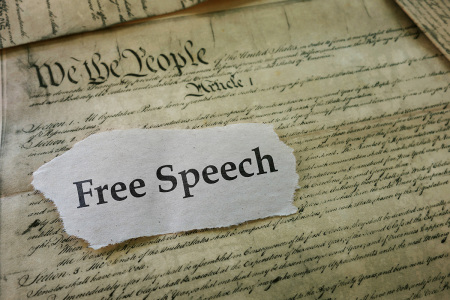University of Alabama agrees to drop 'speech zones' after student group files lawsuit

An Alabama college has agreed to abandon policies deemed by critics as efforts to suppress free speech in response to a lawsuit from a student group.
In a statement published Monday, Alliance Defending Freedom, a legal nonprofit specializing in religious freedom cases, announced that the University of Alabama in Hunstville will eliminate “speech zones” and a requirement that students obtain a permit three days in advance before they have the opportunity to speak on campus. The actions by the college come in response to a lawsuit from the school’s Young Americans for Liberty chapter and one of its student members contending that the policies violated the Alabama Campus Free Speech Act and the state constitution.
The lawsuit, filed in July 2021 in the Alabama Circuit Court for the Madison County-based 23rd Judicial Circuit, challenged the University of Alabama in Huntsville’s revisions to its policies governing the “Use of Outdoor Areas of Campus.” The revised policy implemented a requirement that those seeking to hold an outdoor event on campus must submit a Grounds Use Reservation application at least three days before an event.
Additionally, the policy established an exemption to the requirement to receive advanced permission to hold an outdoor event on campus for “spontaneous activities of expression,” defined as those “generally prompted by news or affairs coming into public knowledge less than 48 hours prior to” the impromptu gathering. However, it limited the places where students could engage in “spontaneous activities of expression” to a few “defined areas.”
The lawsuit characterized the University of Alabama in Huntsville’s policy as a violation of the Alabama Campus Free Speech Act, which gives students the right to “spontaneously and contemporaneously assemble, speak and distribute literature” and declares that “outdoor areas of a public institution of higher education shall be deemed to be a forum for members of the campus community, and the institution shall not create free speech zones or other designated outdoor areas of campus in order to limit or prohibit protected expressive activities.”
The complaint also maintained that the University of Alabama in Huntsville violated Article I, Section 4 of the Alabama Constitution, which states “no law shall ever be passed to curtail or restrain the liberty of speech or of the press; and any person may speak, write, and publish his sentiments on all subjects, being responsible for the abuse of that liberty.”
The plaintiffs asked a judge to declare the “prior approval requirement, spontaneous expression exception, speech zones, and associated policies and practices” unconstitutional and prevent the school from enforcing them.
The latest version of the policy, released along with the settlement Monday, has removed all references to “spontaneous expression” and a “defined area.” The plaintiffs and the attorneys representing them have rejoiced in the development.
“College students have the freedom to share their beliefs anywhere on campus; they don’t need permission from college officials to speak, nor should they have to jump through burdensome and illegal hoops just to talk with their classmates outside,” said ADF Senior Counsel Tyson Langhofer.
“Alabama state law guarantees that all students at public universities can freely speak outdoors on campus grounds. We commend the University of Alabama in Huntsville for doing the right thing by amending its policy to respect students’ free speech rights.”
JP Kirby, the director of Student Rights at Young Americans for Liberty, cited the ruling as evidence that “students must be vigilant and stick to their principles against university bureaucrats.” He expressed gratitude for the plaintiffs and attorneys “seeing this fight through to the end,” vowing to “continue to use this momentum to fight for student free speech in Alabama.”
The Foundation for Individual Rights and Expression, formerly known as the Foundation for Individual Rights in Education, has given the University of Alabama in Huntsville a “yellow light” rating, indicating that it has “at least one ambiguous policy that too easily encourages administrative abuse and arbitrary application.”
FIRE has rated hundreds of colleges and universities based on the free speech climate, with “green light” schools having the best policies protecting free speech and “red light” schools having the most hostile environments for free speech. Two other schools that are part of the University of Alabama system, the University of Alabama and the University of Alabama at Birmingham, also received “red light” ratings while Auburn University, also located in the state, received a “green light” rating.
Ryan Foley is a reporter for The Christian Post. He can be reached at: [email protected]





















